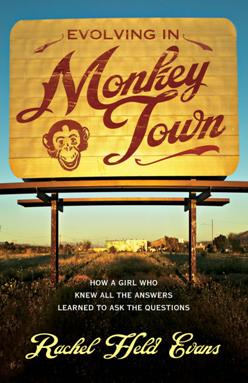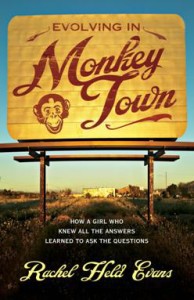A few days short of three weeks ago, by way of what I could call nothing less than an Internet miracle, I stumbled upon Rachel Held Evans’s blog. She is a writer and a wife, a Christian egalitarian and a blogger in whose repertoire she tackles topics like gender roles, John Piper and why Calvinism makes her cry.
It was mild obsession at first sight.
Naturally, three and a half or four minutes later, I succumbed to the compulsion to order her book: Evolving in Monkey Town: How a Girl Who Knew All the Answers Learned to Ask the Questions. As of tonight, it is the second book I’ve read start to finish in 2012.
The book is a memoir of her faith journey so far. Her faith’s foundation started at home and church and was fostered further by her Protestant education. The book explores her faith’s evolution through the years she spent in high school, in college and working for newspapers (I know what you’re thinking: “Are you and Rachel Held Evans the same person?” No. But if I were married to a guy named Dan and she were Catholic, that “no” might be debatable.). It defines the difference between doubting God and doubting what we believe about Him. It challenges the uncanny knack some Christians have for confusing “faith” with “certainty.” It encourages critical thinking and growth. And friends, it is fabulous. I laughed, I fist pumped and I forced my mom to let me passionately read excerpts of it aloud to her. Scroll down to see some of my favorites (with the best lines bolded):
“I’m an evolutionist because I believe that the best way to reclaim the gospel in times of change is not to cling more tightly to our convictions but to hold them with an open hand. I’m an evolutionist because I believe that sometimes God uses changes in the environment to pry idols from our grip and teach us something new.” – pages 21-22
“Dan always says that as soon as you think you’ve got God figured out, you can bet on the fact that you’re wrong.” – page 118.
“When we require that all people must say the same words or subscribe to the same creeds in order to experience God, we underestimate the scope and power of God’s activity in the world.” – page 132
“If the poor were the most receptive to Jesus and his message, then the religious were the most repelled by it. They benefited too much from the status quo to benefit the radical teaching of Jesus, so they tested him with trick questions, criticized him for hanging out with sinners and ultimately helped arrange for his crucifixion.” -page 153
“… I’m also convinced that our interpretations of the Bible are far from inerrant. The Bible doesn’t exist in a vacuum but must always be interpreted by a predisposed reader. Our interpretations are colored by our culture, our community, our presuppositions, our experience, our language, our education, our emotions, our intellect, our desires, and our biases. My worldview affects how I read the Bible as much as the Bible affects my worldview.” -page 192
“Sometimes I wonder who really had the most biblical support back in the 1800s, Christians who used Ephesians 6 to support the institution of slavery, or Christians who used Galations 3 to support abolition. Both sides had perfectly legitimate verses to back up their positions, but in hindsight, only one side seems even remotely justifiable on a moral level. On the surface, the Bible would seem to condone slavery. But somehow, as a church, we managed to work our way around those passages because of a shared sense of right and wrong, some kind of community agreement. Maybe God left us with all this discontinuity and conflict within Scripture so that we would have to pick and choose for the right reasons. Maybe he let David talk about murdering his enemies and Jesus talk about loving his enemies because he didn’t want to spell it out for us. He wanted us to make the right decisions as we went along together.” -pages 193-194
Click here for more about Evolving in Monkey Town. And click here to read Rachel’s blog.


